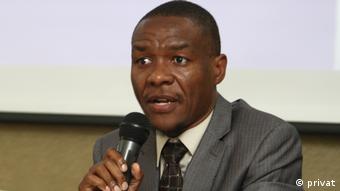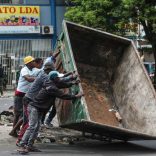Mozambique adds over €12 million to public debt in Q2 2025"
Hidden debts: “Internal hand” may be delaying audit in Mozambique

DW (File photo) / Ematum is one of the public companies that contracted loans
In an interview with DW Africa, an economist with the Mozambican Debt Group argues that “public authorities” may be trying to manipulate the findings of the international ‘hidden debts’ audit, which was postponed for the third time this Thursday.
Mozambique’s Attorney General’s Office announced on Thursday (27.04) that the report on hidden debts being prepared by Kroll would only be published on May 12, and not at the end of this month as planned.
This is the third time that publication has been postponed. According to Mozambican Debt Group economist Humberto Zaqueu, postponing the presentation of the audit may represent an “inside effort” by political players to adulterate the results.
“What is happening now is that the public authorities are not accepting that the report comes out as it is before some things are changed. This may be the angle,” Zaqueu says.
In an interview with DW Africa, Zaqueu commented on the recent “legalization” of debts hidden from the Assembly of the Republic, which could weaken the image of the country internationally and the accountability of the possible authors of the debt.

DW Africa: On Thursday, the Attorney General’s Office announced that the publishing of the audit report on hidden debts would be postponed to May 12, and not happen by the end of this month as scheduled. Is there reason to suspect the credibility of the audit or the Kroll company?
Humberto Zaqueu (HZ): This postponement is not totally surprising, because it was predictable. We have had other previous postponements, and this is the third. So, everything was to be expected, in fact. And maybe a further fourth postponement. If they told us that it was coming out at the end of the year, it wouldn’t surprise us. And one of the questions that we were already asking the IMF [International Monetary Fund] is how it was it going to avoid situations like this.
For us, this has only one explanation. We do not doubt the results of Kroll’s audit, on the contrary, we think that, because of the profile the company presents and the work it has been doing, it is a very well-chosen company that will bring credible results. What may be happening here is an inside job, an “internal hand” trying to tinker with the audit results. I believe that the results already exist. So what is happening now is that the public authorities are not accepting that the report comes out as it is before some things are changed. This may be the angle of attack.
DW Africa: Does legalising the debt weaken Mozambique’s position with creditors?
HZ: It definitely does. It weakens us, because it is more than clear with each passing day. We as a group continue to say: Whatever happens to the debts, at the international level there is already a well done-performed investigation into the banks that made the hidden loans to the government. So from the information at the international level, we already have a position and, perhaps, clearer details of what can be expected from this audit, because we already expected all these constraints in relation to it. At the international level, what we have in terms of information is that, definitely, the banks are doomed. Its creditors, mostly US funds, which give money to, for example, Credit Suisse, are also very unhappy and are even considering the possibility of suing Credit Suisse, Because the bank itself was not forthright in presenting what is a basic study before granting the debts. In this case it is very clear that Mozambique should not have accepted the hidden loans. And when we legalize them, it’s just a shame. This may, in fact, increasingly weaken confidence in the country. We do not take the debts, no one has to pay. If somebody has to lose, it’s the banks. And inside the country someone has to be held accountable.
DW Africa: Does this legalisation hinder possible legal accountability of debtors?
HZ: Clearly. That is why we legalised them. Precisely, I am saying that something has gone wrong, but we are tidying up the house, like a normal audit, which says that it is not to penalise anyone, but that is to help organise the files and the dossiers. Pretty much, it looks like things are moving in this direction. We need to know that this audit being made is of another nature. It is not an audit of a company, it is an audit of a nation. And, above all, why was the audit requested? Because we need stuff to hold someone accountable. There is a fundamental objective here that has to be respected. And when we legalise things prior to the announcement of audit decisions, it means that we are effectively weakening the possible accountability of the perpetrators, a moral and, perhaps, material, accountability of these debts, and this protects the culprits.
DW Africa: Kroll asked to access the accounts of the former president, Armando Guebuza. He tightens the noose on the audit and now the debts are legalised. Is it a coincidence?
HZ: Maybe it’s a coincidence. As for this, we do not have much to say, because we know that in relation to people accounts, there is a lot of privacy, and we do not find legal tools here that can help us take a position on this. In any case, they are the auditors, they know what kind of information they need. And for us it may be a mere coincidence. We can not form an opinion against or in favour of accessing personal accounts. But transgression of the legal framework has to be held accountable. We know how people actually transgressed; what was to be done and was not done, and we know who was at the head of the proceedings, and we know. So, from this, it is clear what there is to be held accountable for and who to hold accountable for it. This is very clear.













Leave a Reply
Be the First to Comment!
You must be logged in to post a comment.
You must be logged in to post a comment.